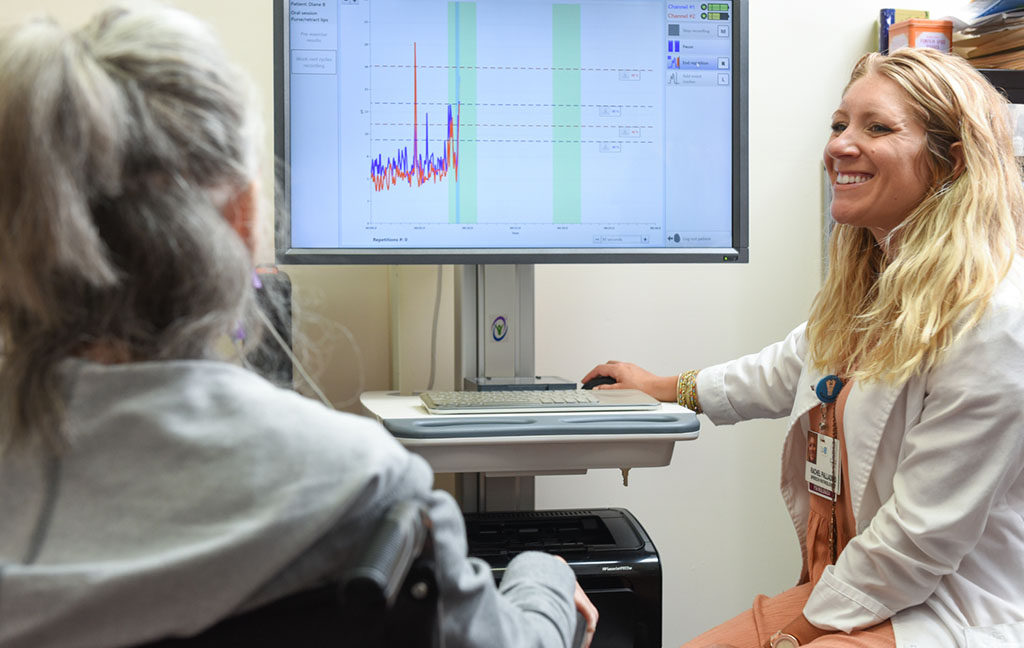- Rehabilitation/ Physiatry Medicine
- Occupational Therapy
- Physical Therapy
- Speech -Language Pathology
- Therapeutic Recreation
- Rehabilitation Nursing
- Respiratory Therapy
- Strengthening and Conditioning
- Medically Complex- Cardio-Pulmonary Specialty Program
- Orthopedic and Fracture and Surgery Recovery
- Joint Replacement
- Total Knee
- Total Hip
- Shoulder Replacements
- Fractures
- Stroke Rehabilitation
- Parkinson’s Disease Program
- Spinal Cord Injury
- Brain Injury
- Neurological Reeducation
- Back/Spinal Surgery Recovery
- Prosthetic Management and Amputee Program
- Pain Management
- Arthritis / Joint protection
- Balance and Vestibular Management
- Lymphedema Management
- Wound Management
- Aural Communication Program
- Continence Improvement
- Diabetic Management and Interventions
- Bariatric Programming
- Dysphagia Rehabilitation/ Feeding management
- Low Vision Management
- Energy Conservation/Work simplification
- Medication Management
- Community Re- entry
Clinics
- Wheelchair Clinic
- Contracture / Orthotics Clinic / Prosthetic Clinic
- Falls Prevention / Mobility Clinic
Fall Prevention programming
- Safety
- Balance
- Strengthening
- Environmental adaptation
- Modality Treatment
Multiple Sclerosis / Parkinson’s Disease / Stroke Program and Management
Contracture Management Rehabilitation
Wheelchair Seating and Positioning
Dementia- Cognitive Specialty Programming
- Alzheimer’s Rehabilitation
- Allen Cognitive Level testing
- Cognitive Retraining
- Activities Specialty Programming
Geri-psych Programming
Activates/Leisure Identifications Program
Restraint Reduction
Dysphagia
- Occupational Therapy and Speech-Language Pathology and Restorative Dining
- Dining Rounds
Happy Feet Program
Walk to Dine Program
Cardiac Rehabilitation is effective in managing Coronary Artery Disease (CAD), Congestive Heart Failure (CHF), Ischemic Heart Disease (IHD), and Cardiomyopathy. Cardiac Rehabilitation is also effective in managing post-surgical heart valve surgery, Coronary Artery Bypass Surgery (CABG), Left Ventricular Assist Device (LVAD) implantation, and heart transplants.
Pulmonary Rehabilitation is used to manage Chronic Obstructive Pulmonary Disease (COPD), Interstitial Lung Disease (i.e. pulmonary fibrosis, asbestosis, etc.), and Pulmonary Hypertension. It also aides in post-surgical lung resection, pneumonectomy and lung transplantation.
The majority of our patients in Cardiac Rehabilitation are CHF and IHD patients. In our Pulmonary Rehabilitation program, most of our patients have COPD. Also, many of our patients have co-morbid conditions (COPD and CHF).
The cardiopulmonary rehabilitation program features a multidiscipline approach to manage medically complex patients. The featured components of our program includes:
Patient Assessment
Evaluation:
- Medical History: including cardiovascular (including peripheral vascular and cerebrovascular) and pulmonary diagnoses, prior cardiovascular procedures (including assessment of left ventricular function)symptoms, and co-morbidities
- Medical assessments by our board – certified cardiologists and pulmonologists
- Physical assessment by our highly skilled nursing and therapeutic staff
Interventions:
- Individual Treatment Plans which reflect the patient evaluation with detailed priorities for risk reduction and rehabilitation
- Development and implementation of short-term and long-term goals and strategies to reduce disability and subsequent cardiovascular disease risk
Nutritional Counseling
Evaluation:
- Obtain estimates of daily caloric intake and dietary content (fats, carbohydrates, protein)
- Assess eating habits and alcohol consumption
Interventions:
- Individualize diet plan and educate patient and family/caregivers regarding dietary goals and how to attain them
- Prescribe specific dietary modifications to improve lipid levels
Hypertension
- Assess treatment and compliance
Smoking Cessation
Evaluation:
- Assessment of smoking status
- Assess for confounding psychosocial issues
Interventions:
- Encourage physician, staff, and family support
- Provide individual education and counseling by program staff, supplemented by self – learning materials
Weight Management
Diabetes Management
Psychosocial Management
Physical Activity Counseling
Evaluation:
- Assess current activity levels and determine domestic, occupational, and recreational needs
Interventions:
- Develop exercise program to meet individual needs and provide educational counseling
- Advise low-impact aerobic activity to minimize risk of injury
- Set goals to increase physical activity
Exercise Training
Evaluation:
- Exercise evaluation, including assessment of heart rate and rhythm, signs, symptoms, ST segment changes and exercise capacity
- Structured exercise program which may include EKG monitoring as deemed necessary

